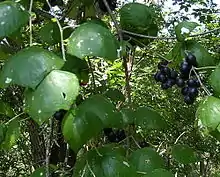Vitis mustangensis
Vitis mustangensis, commonly known as the mustang grape, is a species of grape that is native to the southern United States. Its range includes parts of Mississippi, Alabama, Louisiana, Texas, and Oklahoma.[1][2]
| Vitis mustangensis | |
|---|---|
 | |
| Scientific classification | |
| Kingdom: | Plantae |
| Clade: | Tracheophytes |
| Clade: | Angiosperms |
| Clade: | Eudicots |
| Clade: | Rosids |
| Order: | Vitales |
| Family: | Vitaceae |
| Genus: | Vitis |
| Species: | V. mustangensis |
| Binomial name | |
| Vitis mustangensis | |
| Synonyms[1] | |
Description
This woody species produces small clusters of hard green fruit that ripen into soft 3⁄4-inch (2 cm) dark purple berries in August–September.
They have a thick outer layer of flesh and on average contain four seeds. This variety of grape is recognized by the white velvet-like underside of the leaves, and often covers small trees, shrubs, fences and other objects that it grows near.[3]
V. mustangensis is dioecious, with only female vines bearing fruit.[4]
Culinary use
The fruit can be potentially irritating to the skin when picked or eaten, and are mildly unpleasant to eat because of bitterness and high acidity content.
The grape has a culinary use as jelly and grape juice, both of which are typically sweetened with sugar so as to be palatable. They can also be baked into cobblers, as some early cookbooks in the region directed.[4]
Mustang grapes have also been used to make mustang wine since before the Civil War.[5]
The fruit and leaves of Mustang Grapes may also be used to dye wool.[6]
References
- "Vitis mustangensis". Germplasm Resources Information Network (GRIN). Agricultural Research Service (ARS), United States Department of Agriculture (USDA). Retrieved 2010-12-07.
- Biota of North America Program 2014 county distribution map
- Lynch, Daniel. Native and Naturalized Woody Plants of Austin and the Hill Country. Saint Edward's University, 1981, p. 95.
- "Wild Harvest: Texas' Bounty of Native Fruits|| TPW magazine|August/September 2013". tpwmagazine.com. Retrieved 2019-03-06.
- C. Allan Jones, Texas Roots: Agriculture and Rural Life Before the Civil War, College Station, Texas: Texas A&M University Press, 2005, pp. 148-149
- Tull, Delena. Edible and Useful Plants of Texas and the Southwest: A Practical Guide. University of Texas Press, 1987, p. 206-208.
External links
 Media related to Vitis mustangensis at Wikimedia Commons
Media related to Vitis mustangensis at Wikimedia Commons Data related to Vitis mustangensis at Wikispecies
Data related to Vitis mustangensis at Wikispecies- Agie-horticulture.edu, Texas Native Shrubs — Vitis mustangensis (Mustang Grape)
- Natives of Texas.com: Mustang Grape (Vitis mustangensis)
- UTexas.edu: Image archive of Vitis mustangensis (Mustang Grape)